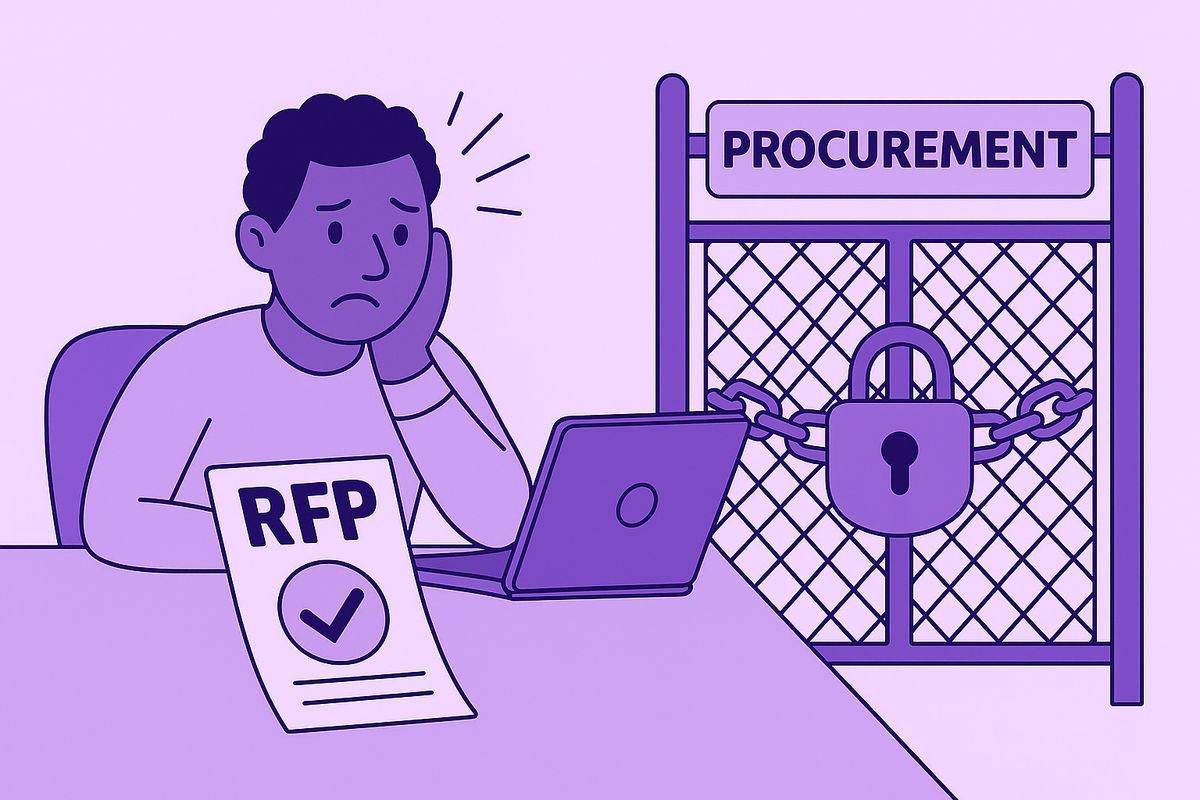The Real Cost of Manual DDQ Responses
June 19, 2025
By
Evie Secilmis

Manual DDQ responses don’t just drain time — they drain momentum.
If you’ve ever had a deal lose steam after a due diligence questionnaire hit someone’s inbox, you know the feeling. The AE thinks it's almost closed. The buyer is nodding along. Then Procurement sends over a 300-row spreadsheet, and the momentum dies quietly in an endless loop of email threads, SME approvals, and last-minute compliance reviews.
Most teams treat DDQs as “just paperwork.” But they’re not. They’re real work — and when your process is manual, they create more friction than anyone admits.
Behind the scenes, Sales leans on Security. Security asks Legal. Legal has edits. The SE gets pulled in to re-answer the same encryption questions they already handled last quarter. Half the answers are buried in past responses or a teammate’s inbox. Everyone’s time is spent stitching together content that already exists — just not where you need it.
That lag doesn’t just slow things down — it changes how your buyer perceives you. Are you responsive? Are you trustworthy? Are you ready to work with an enterprise team with a real security review process? Or are you sending half-baked, copied answers that need asterisks and follow-up? While Due Diligence Questionnaires (DDQs) are often seen as a necessary but time-consuming task, managing them effectively can unlock significant financial, operational, and strategic benefits for your organization.
Understanding the ROI of Effective DDQ Management
Investing time and resources into the DDQ process may seem burdensome, but the potential ROI from improving this critical function can be substantial. Here’s a closer look at how efficient DDQ management can generate positive returns:
- Accelerated Deal Closures: By streamlining the DDQ response process, teams can significantly reduce the time it takes to close deals. Faster responses convey professionalism and responsiveness, which can directly enhance buyer confidence and lead to quicker negotiations. This can translate into increased sales and revenue.
- Enhanced Team Productivity: When teams are equipped with a centralized knowledge base and AI-powered suggestions, they spend less time searching for answers or deciphering previous responses. This time saved can be redirected towards more strategic activities, such as building relationships with prospective clients or refining sales strategies.
- Improved Customer Trust and Satisfaction: A consistent, timely response to DDQs fosters greater trust with potential buyers. When buyers feel that their inquiries are met with thorough, knowledgeable answers, they are more likely to proceed with business. This can lead to better client retention and potentially more referrals.
- Reduced Compliance Risks: Efficiently managing DDQs minimizes the chances of missing critical compliance requirements, which can lead to costly penalties or reputational damage. Investments in training and automated systems can effectively reduce these risks, translating into long-term savings.
- Scalability for Growth: As companies grow, the volume of DDQs typically increases. Implementing effective DDQ strategies allows businesses to handle larger workloads without a proportionate increase in effort or resources. This scalability can contribute to sustained growth and development.
- Valuable Insights and Data Utilization: A centralized system can collect data on common questions, response times, and approval bottlenecks. Analyzing this data can reveal insights into operational inefficiencies and areas for improvement, enabling companies to optimize their processes continuously.
- Attracting High-Value Clients: With an efficient DDQ process in place, organizations can bid for larger, more lucrative contracts. Many enterprise clients expect a certain level of professionalism and quick responses during the diligence process, and exceeding these expectations can open doors to new business opportunities.
This is where most teams break down — not because they can’t answer the questions, but because they can’t do it consistently, quickly, or clearly. And that’s when trust starts to erode.
Then there’s the invisible cost: the people. Ask anyone who’s been at a high-growth company long enough, and they’ll tell you about dropping everything to finish a DDQ late at night. Or trying to decipher someone else’s answer to a SOC 2 question while they’re out on PTO. Or resending the same response to five different prospects with slightly different wording, wondering which one is “right.”
This isn’t scalable. It’s not strategic. It’s not how high-performing teams work.
And yet — it’s the norm.
The alternative? Build a system where the answers don’t live in someone’s head. Where AI suggests your best language based on what worked before. Where you can see who owns what, how long it’s taking, and where approvals are stuck. Where DDQs are part of the process — not a fire drill.
Strategies for Effective DDQ Management
- Centralized Knowledge Base: Implement a centralized system where all DDQ responses are stored. This helps team members access up-to-date information quickly and reduces the need to sift through multiple emails or documents.
- AI-Powered Suggestions: Utilize AI-driven tools to analyze past responses and suggest the best possible answers. This technology not only speeds up the response time but also enhances the accuracy of the information presented.
- Collaborative Platforms: Employ collaborative software that allows teams to work together seamlessly. Assign specific roles and track the status of responses to ensure accountability and transparency throughout the process.
- Regular Reviews and Training: Regularly review the responses and provide training for team members to improve understanding and clarity. Keeping everyone informed about updates in compliance and protocol will help maintain consistency.
That’s what Iris does.
It helps your team stop scrambling and start responding — with speed, with consistency, and without pulling your SEs and compliance leads away from the work that actually moves deals forward.
Because documentation is necessary.
But burnout is not.
And every hour your best people spend on repetitive questionnaires is an hour they’re not spending helping you win.
Want to learn more about DDQs? Check out the blog post- What is a DDQ?
Share this post
Link copied!





















